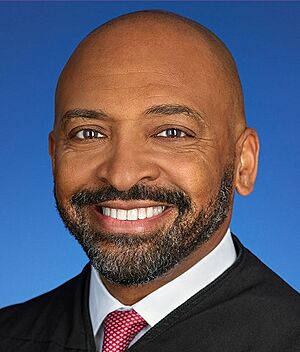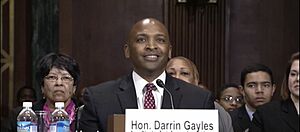Darrin P. Gayles facts for kids
Quick facts for kids
Darrin P. Gayles
|
|
|---|---|
 |
|
| Judge of the United States District Court for the Southern District of Florida | |
| Assumed office June 19, 2014 |
|
| Appointed by | Barack Obama |
| Preceded by | Patricia A. Seitz |
| Personal details | |
| Born |
Darrin Phillip Gayles
December 16, 1966 Peoria, Illinois, U.S. |
| Education | Howard University (BA) George Washington University (JD) |
Darrin Phillip Gayles (born December 16, 1966) is an important judge in the United States. He serves as a federal judge for the United States District Court for the Southern District of Florida. Before this, he was a judge in Florida's state courts.
Contents
Education and Early Career
Learning to Be a Lawyer
Darrin Gayles studied at Howard University, where he earned a Bachelor of Arts degree in 1990. He then went to George Washington University Law School and received his law degree (called a Juris Doctor) in 1993.
Working as a Lawyer
After law school, Gayles started his career as a lawyer. From 1993 to 1997, he worked as an assistant state attorney in Miami-Dade. This means he helped the state bring cases against people accused of crimes.
Later, from 1997 to 1999, he worked for the U.S. government. He was an assistant district counsel for the United States Immigration and Naturalization Service. From 1999 to 2004, he served as an assistant United States attorney. In this role, he represented the U.S. government in legal cases.
Judicial Career
Becoming a State Judge
In 2004, Darrin Gayles became a judge for the first time. He served as a county judge in Miami-Dade County. This is part of Florida's Eleventh Judicial Circuit. From 2011 to 2014, he moved up to become a circuit court judge in the same circuit.
Becoming a Federal Judge
On February 6, 2014, President Barack Obama chose Darrin Gayles to become a federal judge. He was nominated to serve in the United States District Court for the Southern District of Florida. This position became open when Judge Patricia A. Seitz retired.
His nomination was reviewed by the United States Senate Judiciary Committee. This committee holds hearings to decide if a person is right for the job. On April 1, 2014, Gayles had his hearing. The committee approved his nomination on May 8, 2014.
The full United States Senate then voted on his nomination. On June 17, 2014, the Senate confirmed him with a vote of 98 to 0. This made him the first African-American federal judge to be confirmed with a unanimous vote. He officially became a judge on June 19, 2014.
Important Cases
As a federal judge, Gayles has handled many important cases. In July 2020, he was part of a panel of judges for the United States Court of Appeals for the Eleventh Circuit. He disagreed with the other judges in a case about a voting law in Alabama. He felt that the court should have looked more closely at Alabama's history when deciding if the law was fair. He believed that past issues with voting rights were important to consider.
 | Bayard Rustin |
 | Jeannette Carter |
 | Jeremiah A. Brown |


